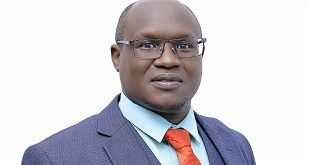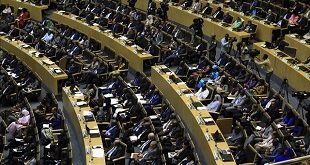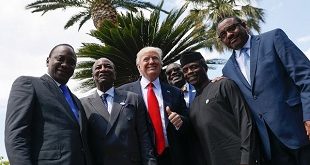
By Haggai Matsiko
Regional peace rests on untested 1,200-strong UN force
The announcement that Ugandan troops are exiting South Sudan has sparked both relief and fear. There is relief because since the Jan. 23 Cessation of Hostilities Agreement signed by South Sudan President Salva Kiir and opposition leader Riek Machar called for the withdrawal of all foreign troops in South Sudan, Uganda has appeared reluctant to leave. This has triggered speculation that the continued stay would jeopardise the peace deal.
Now that Uganda is leaving, relief has given way to apprehension especially regarding the security vacuum that creates for President Kiir and the region.
Juba has been reluctant to implement the peace deal, which enables Machar to keep his army in the capital and brings a UN force of 1,200 at the heart of the ceasefire monitoring mechanism.

Such stances continue to make peace appear elusive in South Sudan, where the UN warned that the situation has worsened since the peace deal was signed, albeit under intense international pressure. Untold atrocities have pushed the country’s people to the edge with more than four and a half million depending on food aid.
When he made the withdrawal announcement to journalists on Oct.12 at the Uganda Media Centre in Kampala on Oct.12, the Chief of Defence Forces (CDF), Gen. Katumba Wamala, merely said that the exit exercise includes movement of troops and weapons and would last up to early November. Foreign Affairs Permanent Secretary, Ambassador James Mugume, explained that the exit was an effort to abide by the UN resolution.
Details gathered from other sources indicate that President Yoweri Museveni, who has over the one and half years defied several calls to pull out of South Sudan, has been under insurmountable pressure, calculations and a lot of diplomatic efforts including towards Sudan leader President Omar al-Bashir.
The decision to exit South Sudan followed an Oct.9 resolution by the UN Security Council, which warned of taking appropriate measures against those preventing implementation of Sudan’s peace accord.
The resolution also comes hardly two weeks after President Museveni co-chaired a UN General Assembly 70th Session and the AU Peace and Security Council meeting in New York.
Museveni warned
With the UN warning that the situation in South Sudan had worsened since the peace deal was entered, and the US pushing for an arms embargo and sanctions, South Sudan was at the centre of a rapid series of meetings attended by Museveni.
One of the results of these meetings is that the UN is sending a force of about 12,000, which will replace the UPDF.
Before the New York meetings, President Museveni paid a visit to Sudan’s al-Bashir on Sept.15, to discuss among others, peace in South Sudan.
Before the meeting, Sudanese Foreign Minister Ibrahim Ghandour said that Sudan and Uganda would work to bring stability in the neighboring South Sudan, pointing out that the conflict in the country affected the two countries.
During President Museveni’s visit in Sudan, rebel leader Machar, was reportedly flown into Khartoum in a chopper belonging to the presidency and held talks with the two presidents about the implementation of the peace agreement.
As Ghandour noted, President Museveni’s visit was important in improving relations between the two countries but most importantly in as far as it allows the two countries to discuss and assist in restoring peace in South Sudan. The two countries have been equally blamed over their roles in the South Sudan conflict.
When Uganda first deployed in South Sudan on December 15, 2013, President Museveni was blamed for attempting to keep Salva Kir in power. President Museveni explained that he intervened in South Sudan to prevent a blood bath in Uganda’s biggest regional market but also to prevent a refugee crisis in the northern part of Uganda. The other issue is that a crisis in South Sudan threatened to offer Joseph Kony and his Lord’s Resistance Army (LRA) an opportunity to re-emerge as a serious security threat.
Since Kony was hounded out of Uganda, he has been hiding in DR Congo and Sudan with Uganda accusing the former of harboring its enemies. Sudan has also accused Uganda of harboring her enemies and on some occasions threatened to sponsor Uganda’s enemies.
It was easy, therefore, for Sudan to accommodate and assist rebels fighting Kiir’s government, which apart from having been at war with Sudan over especially was now being protected by another enemy in Uganda.
Such is the complex relationship between the three countries. Indeed Uganda’s decision to intervene in South Sudan followed a request from a South Sudanese official, who at the height of the Kony war had supplied key intelligence to Uganda showing that Sudan was not only supplying Joseph Kony with weapons, it was also technically advising him throughout his ruthless campaign in the north.
With the new war in South Sudan, the rebels found a sponsor in Sudan. The Independent understands that at the beginning of the war, international investigators were following leads on a cache of arms that had come through Asmara to Sudan and to the camps of Machar’s rebels. In Khartoum, insiders say, the South Sudan rebels are treated as high profile guests.
With this state of affairs, therefore, Museveni knew that any attempts to end the South Sudan conflict had to bring Sudan on board.
Initially, President Museveni was keen to hold talks with Machar’s rebels, who were for some time hosted in Kampala as state visitors but the effort did not amount to much. Apparently, President had been advised that the best way to deal with the delicate South Sudan issue would be for the rebels to feel that he was open to listen to listen to them. But their continuing attacks against the Juba government forces seem to have frustrated these talks. Matters were not helped by the failure by two gang-ho South Sudan factions to sign the peace accord.
Such stances continue to make peace elusive in Africa’s youngest country.
Trade threatened
By August this year, threats by rebels in South Sudan to strike and close down the only road linking the war-torn country to Ugandan put a group of UPDF fighters based in the country on high alert.
Nimule Highway, which the rebels threatened to close down, is the only route to the main base of the Uganda contigent in South Sudan in Gulu. This is the Fourth Division Headquarters, which is also under Brig.Muhanga Kayanja who has been commanding the force in South Sudan.
It is also the only route for trade between the two countries. South Sudan is Uganda’s major regional market. Exports to the country brought an estimated $1.3 billion in 2012 before the war broke out in December 2013. Although trade volumes have since dropped by upwards of 70 percent, shutting down Nimule would mean no trade at all.
President Museveni cited trade as one of the reasons Uganda had chosen to deploy in South Sudan. Over 3000 soldiers have been in the country since then with expenses taken care of by the Ugandan government.
On the flip side, Ugandan tax payer who has been coughing billions in operational costs of the almost two-year intervention will also be feeling some relief. Uganda has had over 3000 troops stationed in South Sudan since 2013.
In April this year alone, the UPDF demanded 16.2 billion for South Sudan operations with Ugandan officials saying this was just a drop in the ocean compared to the life and several Uganda interests at stake.
Regarding the regional cost implication of the war, the London-based consultancy group, Frontier Economics, in a report titled ‘South Sudan: The Cost of War’ published last year noted that restoring peace in South Sudan would save Kenya, Uganda, Ethiopia, Tanzania and Sudan some US$53 billion over five years by reducing expenditures to deal with the increasing number of refugees and other security concerns.
Aware of this cost and the untold human suffering, the respective countries under their umbrella, the Inter-Governmental Authority on Development (IGAD) and the international community have been trying to resolve the conflict.
At first, Kiir had declined to cooperate and opened a gap for the international community to accuse him and his ally, Museveni, of seeking all-out war. The peace process has also been hindered with secret operations by security contractors to train fighters for the Sudan government as earlier reported by The Independent.
Such plans exposed the futility of the reconciliation efforts in which regional and international actors seemed heavily invested. It is because of some of these issues that initially, days after the peace deal was signed, Uganda remained reluctant to pull out from South Sudan triggering speculation that this continued stay would jeopardise the peace deal.
But Paddy Ankunda, the UPDF spokesperson was quick to reassure that the Ugandan army had not received any instructions from “our bosses to leave” and that they would follow such instructions if they came. The instructions are now here and Uganda is moving out. What follows, however, remains unclear.
 The Independent Uganda: You get the Truth we Pay the Price
The Independent Uganda: You get the Truth we Pay the Price


